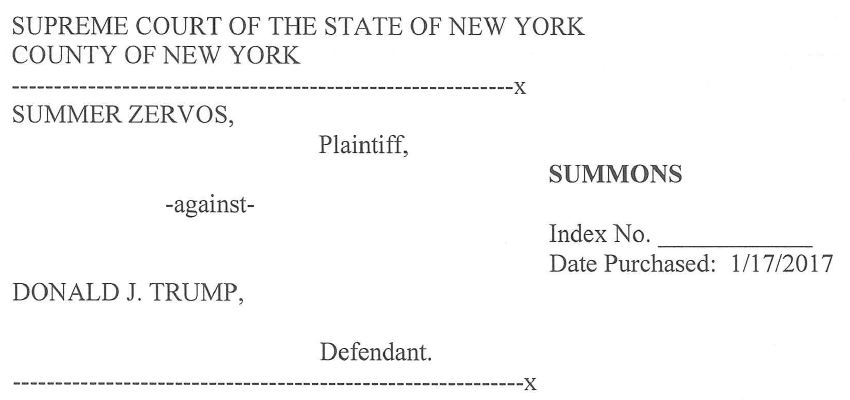On March 20, 2018, a New York state judge held that Summer Zervos, a former contestant on the reality television show The Apprentice, can move forward with her defamation suit against President Trump in Zervos v. Trump, No. 150522/17 (N.Y. Sup. Ct. Mar. 20, 2018). The ruling illustrates both that a sitting President is not immune to civil liability even in state court, and that a defendant’s public response to an accusation of sexual misconduct may give rise to a defamation claim.

During the 2016 presidential campaign, Zervos was one of roughly twenty women who accused Trump of sexual misconduct after the footage from the television show Access Hollywood was made public. On October 14, 2016, Zervos and her attorney held a press conference where she alleged that Trump sexually assaulted her on several occasions in 2007. The following day, Trump denied the allegations as “100% fabricated and made up charges” in a statement on his campaign website. Trump continued to deny the allegations at campaign rallies and in a series of tweets. During the October 19, 2016 presidential debate, Trump again called the allegations “lies” and “fiction.” Finally, during a October 22, 2016 Pennsylvania campaign rally, Trump made the following public statements:
“Every Woman lied when they came forward to hurt my campaign, total fabrication. The events never happened. Never. All of these liars will be sued after the election is over.” (Zervos Complaint, ¶ 74).
On January 17, 2017, Zervos filed a complaint in New York state court, alleging that the President Elect made defamatory statements about her. Zervos alleges she suffered at least $2,914 in financial losses, and seeks an unspecified amount of compensatory and punitive damages. Three days after the complaint was filed, Trump became the 45th President of the United States. Trump moved to dismiss the complaint or continue the lawsuit until after he leaves office. On March 20, the New York court denied his motion, finding that the President has no immunity for purely private acts, even in state court, and that Zervos stated a cause of action for defamation. The court cited the U.S. Supreme Court’s unanimous opinion in Clinton v. Jones, 520 U.S. 681 (1997), which held that a sitting President does not have absolute immunity from civil lawsuits related to conduct prior to the presidency.
After finding that “[n]o one is above the law,” the court also held that Zervos’s complaint met the minimal standard necessary to plead a cause of action for defamation and therefore withstood a motion to dismiss. In support, the court cited a 2014 decision by New York’s highest court in Davis v. Boeheim, 24 N.Y.3d 262 (2014), which held that an action for defamation could be maintained against a defendant who called his accusers liars. In reviewing the alleged public statements Trump made about Zervos, the court found that Trump used “specific, easily understood language to communicate” that Zervos lied to further her interests.
The court’s decision to allow the Zervos defamation claim to proceed hinged on its determination that, as alleged by Zervos, Trump’s statements constituted actionable statements of fact, rather than nonactionable statements of opinion. The court determined that Trump’s “repeated statements … cannot be characterized simply as opinion, heated rhetoric or hyperbole.” Trump’s attorney filed a notice of appeal on April 1, 2018.
Following the court’s order denying Trump’s motion to dismiss the Zervos complaint, on March 26, 2018, Stephanie Clifford (a.k.a. Stormy Daniels), the woman who went public about her alleged sexual relationship with President Trump, amended her complaint against Trump, pending in the United States District Court for the Central District of California, captioned Stephanie Clifford v. Donald J. Trump et al, No. 2:18-cv-02217 (C.D. Cal. Apr 2, 2018). Clifford added a defamation claim again the President’s longtime personal lawyer, Michael Cohen, who allegedly paid her $130,000 to keep the details of the alleged affair secret. Clifford alleges that the public statement Cohen issued on February 13, 2018, stating that “Just because something isn’t true, doesn’t mean that it can’t cause you harm or damage,” was reasonably understood by those who read or heard it to concern Clifford and was “meant to convey that Clifford is a liar, someone who should not be trusted, and that her claims about her relationship with Mr. Trump” are not true. Clifford Complaint, ¶¶ 66-67. Defendants have filed a motion to compel Clifford’s lawsuit to arbitration.
These cases make clear that a public response to an allegation of sexual misconduct may potentially give rise to a claim of defamation.
[View source.]